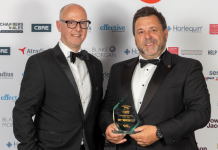KPMG’s third annual Yorkshire Business Instinct Survey, released ahead of Bonfire Night, finds there is fire in the belly of Yorkshire business leaders who claim 2013 has gone with a bang and 2014 is expected to sparkle.
All three of the key performance indicators addressed in the survey – turnover, profit and employment – were more positive during the last 12 months than predicted by Yorkshire’s executives a year ago and expectations are higher still for 2014.
According to the survey, two thirds of Yorkshire’s businesses grew their turnover and profits in the last year, while half boosted their workforce; a set of responses that suggest they slightly outperformed last autumn’s financial predictions and nearly a third more than anticipated grew their workforce.
Looking ahead, the regional market’s confidence is striking, with nearly nine in ten (87%) executives expecting turnover growth and more than four in five (82%) anticipating a profit rise in the next 12 months. Employment prospects in the region are also on the up with two thirds (65%) of businesses intending to grow their workforce in 2014.
When asked for the drivers of growth, the top answers related to increased domestic sales (71%) and economic recovery (52%). More interestingly, nearly half (48%) of those leading Yorkshire’s businesses intend to grow on the back of product or service innovation and four in ten plan to expand their overseas order books.
Commenting on the findings Chris Hearld, KPMG’s office senior partner in Leeds, said:
“The strongest indication of economic recovery is a return of confidence to the business community. The uptick in prospects combined with a trading boost signposts that we are heading in the right direction.
“When it comes to delivering growth, any businesses relying on the sensible but somewhat pedestrian drivers relating to economic expansion are sure to be comprehensively overtaken by those proactively innovating, exporting and investing.
“At this point in the cycle, those managing companies with ambitious growth targets also stand to benefit from making a conscious shift from a protection to a growth mindset. Doing a bit of mental housekeeping and internal communication around this can mean a business is run in such a way that it’s alert to, and primed for, taking advantage of the opportunities – around investment, liquidity and acquisitions, for example – that will result from the improved economic context.”
KPMG’s survey points to an ongoing, indeed growing, focus on cost control. This takes the number one position in terms of challenges, despite the improved confidence levels. With more than half (52%) of those running the region’s corporates naming cost cutting and control as a top three business challenge, it has become a more pressing concern in each year of the survey’s three year history.
Hearld comments:
“This is a shot across the bows, indicating that it will not be an entirely smooth ride to recovery. It is clear that dealing with rising utility prices and pent up wage inflation, whilst still trying to retain sufficient skills and talents is a very difficult balance to strike.
“In second place, nearly half (46%) of the region’s business leaders cite achieving sustainable growth as a challenge for the next year. I’m actually pleased this is on the agenda given the balance between winning more work versus the requirements to control working capital is crucial as the economy expands again.
“A detailed assessment of the working capital requirements and profitability of each new contract should be undertaken, no matter how tempting the volume growth may be. Genuinely sustainable growth, rather than turnover at any cost, is what’s needed for this region to prosper.”






















